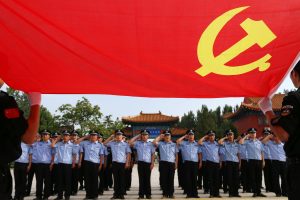The Diplomat author Mercy Kuo regularly engages subject-matter experts, policy practitioners, and strategic thinkers across the globe for their diverse insights into U.S. Asia policy. This conversation with Dr. Timothy Heath – senior international defense researcher at the RAND Corporation and former senior analyst for the USPACOM China Strategic Focus Group – is the 405th in “The Trans-Pacific View Insight Series.”
Briefly explain the relationship between the People’s Armed Forces Department (PAFD) and People’s Liberation Army (PLA) in China.
The PAFD is part of the PLA and staffed by PLA personnel. The PAFDs fall under PLA military district and subdistrict commands and are considered part of the militia system. A major responsibility of PAFD units is to train, organize, and equip militia units. Militia units are part-time soldiers levied by local governments in accordance with Central Military Commission directives and State Council directives.
Analyze the recent rise of PAFDs among Chinese state-owned enterprises (SOEs).
PAFD units played an important role in political mobilization during the Mao [Zedong] years. However, after the CCP abandoned Maoism, the PAFD settled into regular duties such as aiding recruitment for the PLA and training, organizing, and directing militia units.
Under Xi, however, the PAFDs have expanded their presence into corporations. The increased presence owes primarily to fears about rising social instability owing to the slowing economy, high unemployment, labor disputes, and persistent problems of poor governance.
How is the CCP using PAFDs to maintain domestic social stability?
The PAFDs can monitor unrest, collect intelligence, mobilize militia and other resources to aid police in suppressing protests or respond to emergencies that could aggravate unrest. They can also carry out patriotic propaganda such as patriotic, pro-CCP educational activities in schools, factories, and other places. The PAFD can also help with employment through recruitment for the military.
What is the impact of PAFDs on foreign companies operating in China?
Till now, most of the PAFD expansion has occurred within Chinese SOEs [state-owned enterprises] and a few Chinese private companies. It is unclear if foreign companies will have PAFD units as well. This will probably depend on the risk of instability and unrest in areas featuring foreign companies or if authorities believe the foreign companies pose some sort of security risk. Already, the government has stepped up efforts to increase the role of CCP cells within foreign firms owing to security concerns. If China continues to expand the presence of PAFD units across companies in the private sector, foreign firms could be pressed to set them up as well.
Assess how the expanding role of PAFDs reflects the evolution of CCP-led state-society relations.
The expansion of the PAFDs into the corporate sector reflects trends in China in which security concerns are increasingly inseparable from development. As the economy softens and the people’s expectations increase following years of growth, the state is struggling to satisfy the public’s demands. Discontent over the state’s inadequacies has elevated concerns about security and social stability in Beijing. Accordingly, China’s government has invested more resources into monitoring society and bolstering controls. The expansion of the PAFD into the corporate sector reflects these overall trends.

































